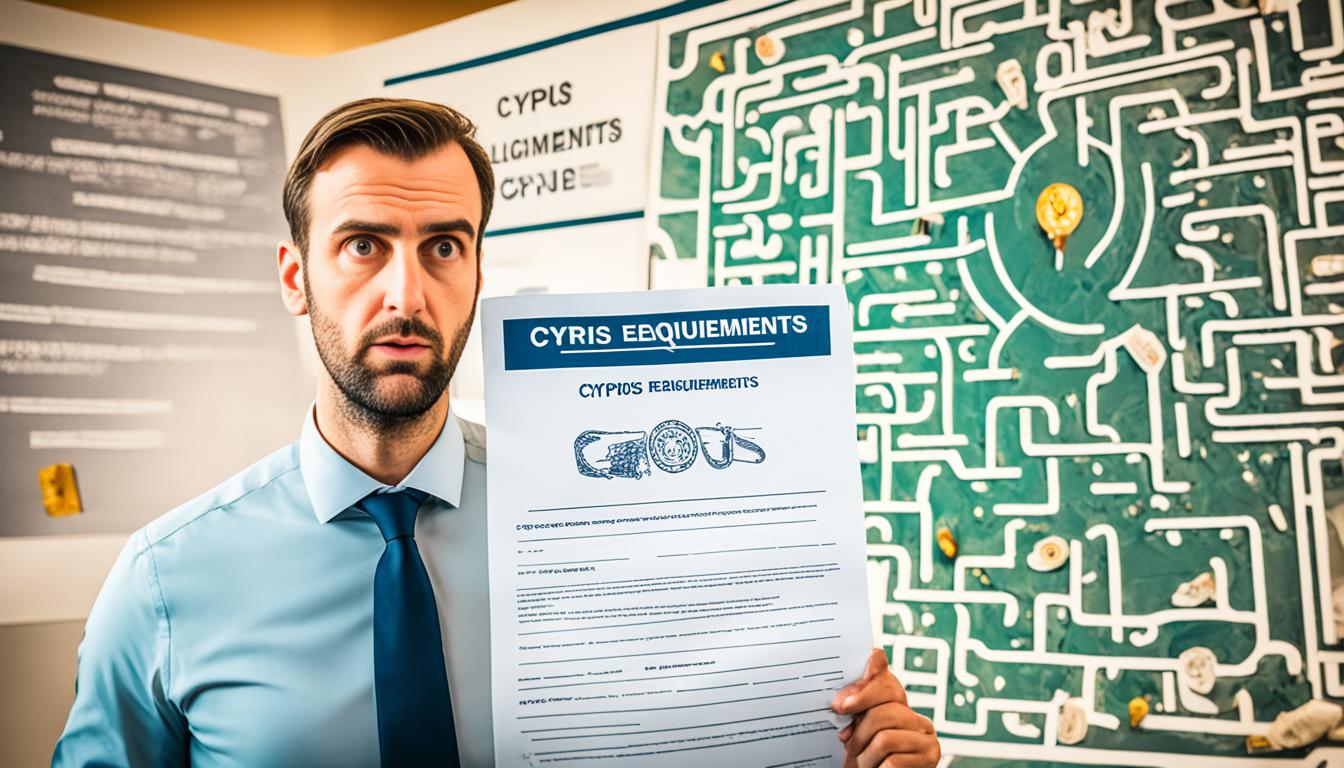
Cyprus citizens can work all over Europe, thanks to being part of the EU. Being an EU member means they can work in any EU country without a special work permit.
But, they must know and follow Europe’s work rules. This makes working in the EU trouble-free and lets them enjoy EU work rights.
Now, we’ll look at the rules Cypriot citizens should know before working in Europe.
Key Takeaways:
- Cypriot citizens have the right to work in any EU country without needing a work permit
- Compliance with Cyprus employment laws is essential to avoid fines and legal consequences
- Registration, social insurance, and permits may be required for working in Cyprus
- EU social security coordination rules protect the social security rights of Cypriot workers in the EU
- Professions may have specific qualification requirements and procedures for recognition
EU Social Security Coordination
The EU made social security rules to help EU citizens move within Europe safely. These rules let Cypriot citizens working in other EU countries use social benefits. It makes their job experience smooth and safe.
EU social security rules work for the EU 27 and four other countries. Cypriot workers in the EU can get healthcare, pensions, and help when unemployed. This is thanks to these social security rules.
These rules protect EU citizens’ rights and make sure social security is fair across borders. They help make sure everyone working in EU countries gets the same treatment. This makes working in the EU fair for all.
“EU social security coordination plays a crucial role in ensuring that Cypriot workers in the EU are entitled to the same benefits and protections as domestic workers. This enhances social cohesion and contributes to a level playing field for all employees in Europe.”
Let’s look at how these rules help a Cypriot worker in another EU country. They can use healthcare services like a local. They join a pension scheme and get their pension when they retire. If they lose their job, they can get help finding a new one.
EU Social Security Coordination Benefits:
- Access to healthcare services in the host country
- Participation in the pension schemes of the host country
- Transferability of accumulated pension rights
- Unemployment benefits and support
- Invalidity and survivor benefits
These EU social security rules help Cypriot workers in many ways. They make sure everyone gets the same treatment and rights. This makes working in the EU a fair and supportive place for all.
In summary, EU social security coordination is key for Cypriot workers in Europe. It gives them many benefits and ensures their welfare. Following these rules lets Cypriot workers seek jobs in the EU with confidence, knowing their rights are safe.
Recognition of Professional Qualifications
If you’re from Cyprus and want to work in another EU country, check if your job there is tightly controlled. If it is, then you must make sure your qualifications fit the rules of the country you want to work in. The same rule applies to EU citizens who want to work in Cyprus. Make sure your qualifications match what Cyprus requires. This is especially true for jobs like lawyers, doctors, accountants, engineers, and electricians.
To start working, you’ll need to send an application to the right place. This could be a professional body or a government office. They will look at your qualifications closely. After checking, they’ll give you the right permit to work.
It’s really important to do this correctly. Following the rules is key to working legally in the EU or Cyprus. Remember, the process is there to make sure everyone meets the correct standards.
| Regulated Professions | Competent Body | Permit Application Process |
|---|---|---|
| Lawyers | The Cyprus Bar Association | Candidates must pass the Cyprus Bar examination and meet other eligibility requirements. |
| Doctors | The Cyprus Medical Council | Applicants must provide evidence of their medical qualifications, complete a registration process, and fulfill any additional requirements. |
| Accountants | The Institute of Certified Public Accountants of Cyprus | Individuals must meet specific academic and professional experience criteria, pass an examination, and undergo further assessment. |
| Engineers | The Cyprus Scientific and Technical Chamber | Engineers must hold an accredited degree, demonstrate practical experience, and meet the Chamber’s registration requirements. |
| Electricians | The Cyprus Energy Regulatory Authority | Candidates need to provide evidence of their qualifications, possess the necessary technical skills, and fulfill the Authority’s registration criteria. |
Entry and Residence Requirements
Cypriot citizens have certain benefits when moving around the EU. They can travel freely with an EU passport or ID card. This rule also applies to their dependents.
Non-EU family members get a residence permit to join their Cypriot loved ones. This process makes joining families easier.
Cypriot workers in the EU must get a registration certificate within four months of arriving. It shows they’re permitted to work in that EU state.
Family members can also work in the EU where their Cypriot relative works. This allows them to help the EU country’s economy.
Knowing and following these rules is crucial. It helps Cypriots and their families live and work smoothly in the EU.
Compliance and Penalties
It’s key to follow employment laws in Cyprus for a smooth work experience. Not obeying these laws can bring about tough penalties. Let’s explore the fines and repercussions of not complying with the law.
Fines for Non-compliance with Cyprus Employment Laws
Cyprus expects people to obey its work laws, or they may be fined. This includes Europeans working there without proper registration. The fine for this offense is up to €2.562,90.
All workers, including Cypriots and other EU citizens, should get registered. This step helps avoid fines and ensures they abide by Cyprus’s work laws.
Consequences of Not Following Cyprus Legal Requirements
“Not following Cyprus legal requirements can have significant ramifications for individuals and businesses. It is essential to understand and adhere to the laws and regulations in place to avoid potential legal issues.” – Cyprus Employment Authority
Ignoring Cyprus’s legal rules can lead to several outcomes, including fines, court actions, and compensation demands. It might even cost you your job or hurt your professional image.
Taking steps to meet legal requirements can guard against these problems. This way, individuals maintain a good standing within Cyprus’s working scene.
EU Employment Regulations
Compliance with work laws goes beyond Cyprus because it’s part of the EU. Cyprus must follow EU work rules that aim to protect workers’ rights. They also ensure equal work conditions across EU states.
Adhering to both Cyprus and EU laws makes the work environment safe and legal. This applies whether working in Cyprus or any other EU country.

EU Initiatives to Improve Employment Opportunities
The European Commission has put in place many initiatives to boost job chances in Europe. These are meant to tackle unemployment and make it easier to find jobs all over the EU. Cypriot citizens, by joining these programs, can look into a broad spectrum of job options in Europe.
EURES: European Employment Services Network
EURES is a big network connecting job hunters, employers, and services across the EU. It helps make it easier to change jobs and offers info, advice, and aid. Cypriot citizens can use EURES to search for jobs, get into training, and find help navigating the job market in Europe.
EU Skills Panorama: Unlocking the Potential
The EU Skills Panorama is a key source for learning about skill needs and supply in Europe. It uses data to show which jobs, industries, and skills are wanted. This helps job seekers, including Cypriot citizens, match their skills with what the job market needs, improving their job chances.
“The EU initiatives like EURES and the EU Skills Panorama play a crucial role in supporting the European Employment strategy and fostering job mobility across the EU.”
– [Insert Name], [Insert Designation]
Promoting the European Employment Strategy
The European Employment Strategy works to make more and better jobs, include more people, and better the job market’s competitiveness. It covers policies like improving skills, job services, and helping start-ups. By following this strategy, EU countries, Cyprus included, aim to better their job markets together.
Job Mobility in the EU
Moving jobs within the EU lets people try many roles, gain global experience, and grow their careers. The EU and the European Employment Strategy help job mobility by cutting barriers, encouraging working across borders, and making it simpler to recognize qualifications. This means Cypriot citizens can try job opportunities in many EU countries, to broaden their work and life experiences.
The EU is proactive in opening up more job chances and a more lively job scene in Europe. By making use of EURES, the EU Skills Panorama, and the European Employment Strategy, Cypriot citizens can find their way in the European job market more successfully. This leads to more opportunities for work growth.
Quality of Life and EU Social Policies
The EU is on a mission to make life better for everyone in its member states. It does this by running programs that help with healthcare, schooling, and how people get around. The goal is to fix problems and make life better in many ways.
Healthcare in the EU
The EU wants all its people to have top-notch healthcare. They have a special plan, the EU4Health Programme, to boost healthcare systems. This program also works to make sure everyone can get healthcare equally, wherever they are in the EU.
Education in the EU
The EU thinks education is super important for people and society as a whole. It works to make sure everyone has the same access to great education. For example, through programs like Erasmus+, students can go to other EU countries to study and gain new skills, helping with their growth.
Transport in the EU
The EU works on making travel easy and safe between countries. It has the Schengen area where people can move without border checks. Plus, the EU looks after rules for air and rail travel. These rules make sure people are safe and treated fairly as they move around Europe.
“The EU’s focus on healthcare, education, and transportation reflects its commitment to enhancing the quality of life for all its citizens.”
The EU wants to stop people from feeling left out and create fairer communities. With many folks growing older, it is also putting effort into taking care of the elderly. This includes plans to ensure they get the help and support they need.
| EU Social Policy Initiatives | Focus Areas |
|---|---|
| EU4Health Programme | Improving healthcare system resilience and access to high-quality services |
| Erasmus+ | Enhancing educational opportunities and mobility |
| Schengen Area | Facilitating free movement of people within most EU countries |
| Air and Rail Transport Regulations | Protecting passenger rights and ensuring safe and efficient travel |
The EU has many plans to help its people live well. By caring a lot about healthcare, education, and travel, it shows it wants its countries to grow and its citizens to be happy and healthy.

Conclusion
It’s crucial for Cypriot citizens to understand and follow the legal rules for working in Europe. They can work in any EU country without a work permit. But, they must know about specific rules for certain jobs, entry and staying there, as well as the need to register and follow the law.
By knowing and sticking to these rules, Cypriots can use their EU work rights fully. This helps them find great job opportunities across Europe. Whether in a special job or looking for various work, knowing the laws makes their move smooth. It also makes their work journey more rewarding.
Understanding their work rights helps Cypriots build a solid career in the EU. They should keep up-to-date with any legal changes. With the right information, Cypriots can do well in their jobs. And they can positively impact Europe’s job market.
